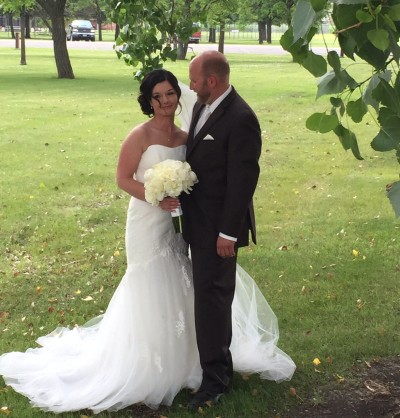John 15: 5-17 and 1 Corinthians 13 Sermon
Later on in this service you will make vows. The vows ask a question – will you love, honor, keep obey etc.?
I will never ask you if you love one another. The idea from our tradition is that you do not know what love is until you are married and that every day is a time to remember your vows “will you love?”. Everyday is the choice made again to follow Christs’ command and love one another.
Jesus reminds us, we did not choose him, we did not claim him as our friend, but he chose us that we might bear fruit. He chooses to die for us and take our sins away and remove from us the power of the Law and death. Jesus does not say that it would be a nice thing if we were to love one another. He commands us to do so. Later in the Bible we read that we can love because He first loved us so he gives us the ability to do what He commands. The followers and friends of Christ follow one who died and destroyed the power of death and the Law to free us to be able to regard one another as valuable and actually care more for others than we care for ourselves because God cares for us and we arecared for.
Thus we are commanded to love because we must learn to love as he has taught us—namely in a way that does not use the sacrifices love brings to control and gain power over the other. For the love that Paul praises—that which is patient, kind, that is not jealous or boastful, arrogant or rude, that does not insist on its own way, that is not irritable or resentful, that bears all things—can be a terribly hard to bear if we have not received the gift to do so from the one who was always patient and kind and who bore all things for us on the cross.
For Jesus has made us his friends, his disciples, part of sharing all he knows about the Father. And what he has shared with us is that God loves us without controlling us, that his love is all-powerful exactly because it is freely given and thus does not need power to be fruitful. WE submit to one another freely and without compulsion because Christ submitted to the Father even to the point of dying for us. It is not just any love that we speak of here, but a love that is based on the command of Christ. Such a love does not seek power or security. It recognizes the sin in the other and offers the forgiveness that Christ won. There is an old cliché that says your sadness is halved and your joys doubled.
One of our theologians wrote it like this – Love is gratitude: it is thankfulness for the existence of the beloved; it is the happy acceptance of everything that he gives without jealous feeling that the self ought to be able to do as much; it is a gratitude that does not seek equality; it is wonder over the other’s gift of himself in companionship. Love is reverence; it keeps its distance even as it draws near; it does not seek to absorb the other; it desires the beloved to be what he is and does not seek to refashion him into a replica of the self or to make him a means to the self’s advancement. As reverence love is and seeks knowledge of the other not by way of curiosity nor for the sake of gaining power, but in rejoicing and wonder. Love is loyalty it is the willingness to let the self be destroyed rather than the other cease to be.
Christ says that the two become one flesh. He brings you to become one new person in him and makes the whole greater than the sum of the parts because He promises to be there. Through His suffering and death and resurrection He has brought new life and a new person in Him. To this new person Jesus makes a command to love as He has loved us. To this new person Christ promises the power and peace and forgiveness to do just that.


